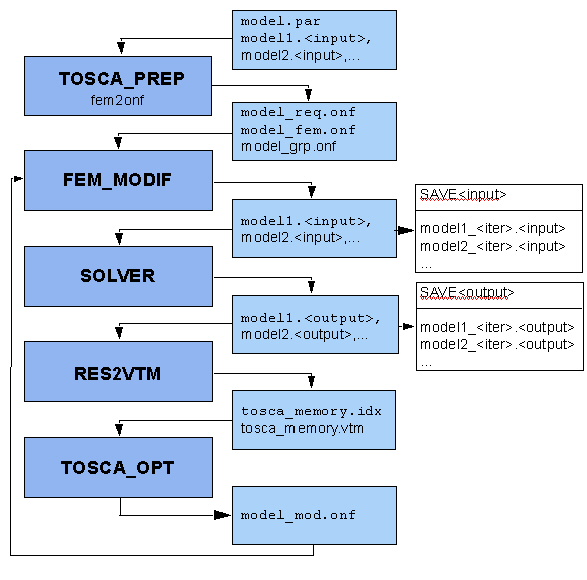Overview | ||
| ||
The flow diagram below is identical for all FE solvers. The optimization preprocessor TOSCA_PREP executes the program fem2onf. This program converts the FE-input-deck into a neutral file format (ONF). The essential information regarding the FE-model is written in the neutral file. The first file called <jobname>_req.onf contains the result requests. These are the FE-results needed for the optimization module. The second file contains FE-model (<jobname>_fem.onf) information, i.e. grid points, elements and etc. The last file contains the group definitions (<jobname>_grp.onf).
The optimization iterations begin when the preprocessor is finished. No previous optimization iterations exist for the first optimization iteration. However, fem_modif modifies the FE-input deck(s) (model1.<input>, model2.<input>, ...) which ensures that requested results are present after FE-analysis.
The chosen FE solver calculates the requested results (model1.<output>, ...). The specific results required for the optimization are read by res2vtm and the results are stored in the database (tosca_memory). Using these results the optimizer TOSCA_OPT generates a modification file (<jobname>_mod.onf). Afterwards, fem_modif once again modifies the original FE-input deck using the modification file. The standard configuration ensures that the FE-input decks will be stored for each optimization iteration in the directory SAVE.<input>. The directory SAVE.<input> also contains the original input deck having the name model_org.<input>. The first and last FE results files are stored in the directory SAVE.<output>.
Flow diagram for SIMULIA Tosca Structure "input" and "output" is
the FE input deck extension and result output extension, respectively.
The extension names correspond to the extensions given
by the FE solver.
 |
Solver type |
SIMULIA Tosca Structure supported input |
SIMULIA Tosca Structure supported output |
|---|---|---|
Abaqus |
*.inp |
*.fil or *.sim (see below) |
*.odb |
||
ANSYS® |
*.cdb |
*.rst |
*.dat |
||
*.inp |
||
MSC Nastran® |
*.bdf |
*.op2 |
(*.dat) |
Some features in SIMULIA Tosca Structure are not available for all solver interfaces.
Solver |
Sensitivity-based Optimizations with contact |
Use of internal Forces |
Frequency Response Optimizations |
|---|---|---|---|
Abaqus |
X |
X |
X |
ANSYS® |
X |
X |
X |
MSC Nastran® |
X |
X |